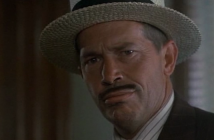
Director: Zhengfan Yang
Country: China
Genre: Drama
Official Trailer: Here
Editor’s Notes: The following review is part of our coverage of the Locarno International Film Festival. For more information on the festival visit pardolive.ch and follow the Locarno International Film Festival on Twitter at @FilmFestLocarno.
As the dawning day gradually arrives over the horizon, so too does Distant make its slow introduction, its early morning opening shot unhurriedly exposing a lonely lighthouse flashing its beam across the quiet sea. At its foot, a human silhouette becomes discernible to the eye, standing alone and staring out in synch with the structure beside. The quiet is contagious in its calm, a soothing silence that ropes the viewer into this world as it meticulously exposes more and more. The arrival of the title card comes, finally, after almost ten minutes; it’s easy, by then, to be surprised by its arrival: such is the lyrical suction of the movie’s allure that it’s difficult not to become intoxicated with its snail-crawl rhythm. Here is a movie that makes Nuri Bilge Ceylan’s 2002 effort of the same name seem a fast-paced thrill ride by contrast.
The arrival of the title card comes, finally, after almost ten minutes; it’s easy, by then, to be surprised by its arrival: such is the lyrical suction of the movie’s allure that it’s difficult not to become intoxicated with its snail-crawl rhythm.
The film’s thirteen static scenes, each immaculately staged and gorgeously lensed, make for a striking average shot length of almost seven minutes, as sure to frustrate the unwilling as to enrapture the on-board. It’s like a slow walk through a cinema gallery: these are not shots in the traditional sense of building blocks of a movie, but rather animated paintings, made to be studied and stared it, experienced in real time and gradually understood more and more. It’s a film that finds its effect in the tiny details that emerge over time: after three minutes we may notice a little feature we preciously missed; another two and we see the important connection between some seemingly disparate things; by the cut, we have looked at this scene so long that we have finally seen it. The distance to which the title alludes is as much ours from the filmed image as anything else.

How extraordinary that director Zhengfan Yang has made this film with a crew composed of just he and two others: cinematographer Zhu Shengze and sound recorder/mixer Huo Siya. They are to typical film crews what a band like Rush is to overstuffed musical ensembles, capable of every bit as much nuance and all the closer for their small number. This is a trio whose sensibilities are perfectly in-synch, Shengze’s detail-studded visuals and Siya’s gently engrossing soundscapes coming to a sublime confluence under Yang’s guiding hand. His scenes alternate between absorbing artistry and gentle humour, now and then dipping into quiet tragedy with a wordless gravitas. It would be silly to say that this is a film for everyone, but those willing to commit themselves to the movie’s hypnotic aura should find themselves transported, even transformed.
It’s a movie that sits snugly within the sphere of slow cinema, nodding its head here and there to the masters of that mode while never seeming to linger in their shadow.
It’s a movie that sits snugly within the sphere of slow cinema, nodding its head here and there to the masters of that mode while never seeming to linger in their shadow. The opening shot calls to mind that of Reygadas’ Silent Light; there’s a hint of Angelopoulos in the lush wedding scene that occupies the frame in another; Tarkovsky comes to mind in the dark river mirror that flows through one frame; it’s hard not to think of Andersson in one set-based sequence steeped in sublimely dry humour. Whether by intention or not, Yang invokes the best of his breed and manages to stand side-by-side with them. What a debut this is, what an unassumingly confident work of cinematic art, delivered with the utmost of conviction yet never the slightest trace of constraint.
“It’s a world created to experience rather than to understand” says Yang of his film. But to experience is to understand; to become one with these tableaux and to be lost within them is to see reflected the eponymous concern of Distant. With the gentlest breed of comedy conceivable, this is a film that looks at the spaces between us and wonders why they exist. Each new shot opens by presenting them to us with tragic beauty; by the time they are eventually cut away, they have been torn down by the slow, spellbinding revelation of their ugliness. The film concludes just where it begun, watching dusk lay claim to the lightness and its lone companion. Has he become any less distant today? Have we?
[notification type=”star”]95/100 ~ AMAZING. Distant is a movie that sits snugly within the sphere of slow cinema, nodding its head here and there to the masters of that mode while never seeming to linger in their shadow.[/notification]



